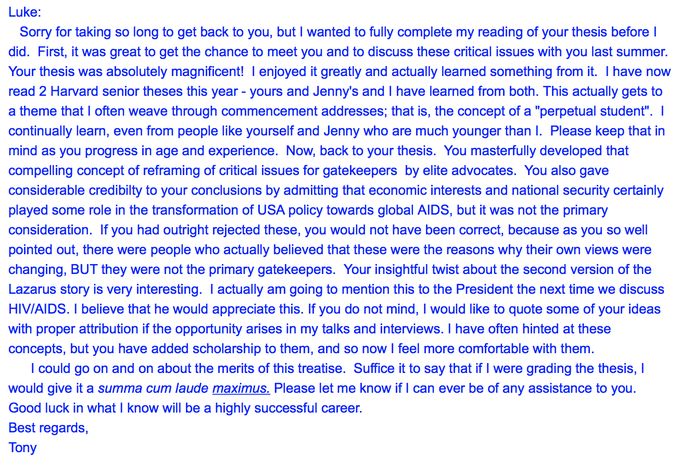Author David Foster Wallace titled his famous address to Kenyon College’s Class of 2005 “This is Water,” a reference to its opening joke — self-mockingly framed as a “didactic little parable-ish story” that is “a standard requirement of US commencement speeches:”
There are these two young fish swimming along and they happen to meet an older fish swimming the other way, who nods at them and says “Morning, boys. How’s the water?” And the two young fish swim on for a bit, and then eventually one of them looks over at the other and goes “What the hell is water?”
Mark Wooding, founder of After Skool, a YouTube channel “committed to finding the most powerful content and delivering it in the most engaging way possible” gave his whiteboard animation of the speech a different title: “Your Mind is an Excellent Servant, but a Terrible Master.”
It’s the “old cliche” Wallace invoked midway through, noting that “like many clichés, so lame and unexciting on the surface, (it) actually expresses a great and terrible truth:”
It is not the least bit coincidental that adults who commit suicide with firearms almost always shoot themselves in: the head. They shoot the terrible master. And the truth is that most of these suicides are actually dead long before they pull the trigger.
Wallace himself died by suicide a little more than three years after delivering the speech, prompting author Tom Bissell to write in an essay for the New York Times that “the terrible master eventually defeated David Foster Wallace, which makes it easy to forget that none of the cloudlessly sane and true things he had to say about life in 2005 are any less sane or true today, however tragic the truth now seems:”
This Is Water does nothing to lessen the pain of Wallace’s defeat. What it does is remind us of his strength and goodness and decency — the parts of him the terrible master could never defeat, and never will.
We braced a bit wondering how Wooding would handle this portion of the speech.
It would have been a good time for one of his more abstract flights of fancy.
In truth, sometimes Wooding’s dry erase drawings cluttered our headspace unnecessarily, distracting from Wallace’s message. Isn’t that ironic? A large part of the speech deals with choosing what to pay attention to, and how to pay attention to it.
In an attempt to follow Wallace’s advice and push back against the “basic self-centeredness …that is our default setting, hard-wired into our boards at birth”, we’ll concede that Wooding’s animation may help the speech land with those who’d give a pass on listening to an audio recording or reading a transcript.
As Wooding told the San Francisco Chronicle, “Some people are visual learners, some learn by hearing things, some have to do it… what I’ve tried to do with After Skool is combine every style of learning to make the ideas as accessible as possible, to take ideas that are kind of complex and make it so that an eighth-grader can understand it.”
The wicket grows a bit stickier when Wooding delves into the long passages wherein Wallace unleashes a torrent of grouchy self-serving thoughts born of boredom, routine and petty frustration… as an “example of how NOT to think”, he says in an aside.
Wallace presented this unvarnished ugliness as a set up, something to throttle back from — an illustration of how our lizard brains’ snap judgments need not get the final word:
… if you’re aware enough to give yourself a choice, you can choose to look differently at this fat, dead-eyed, over-made-up lady who just screamed at her kid in the checkout line. Maybe she’s not usually like this. Maybe she’s been up three straight nights holding the hand of a husband who is dying of bone cancer. Or maybe this very lady is the low-wage clerk at the motor vehicle department, who just yesterday helped your spouse resolve a horrific, infuriating, red-tape problem through some small act of bureaucratic kindness…If you’re automatically sure that you know what reality is, and you are operating on your default setting, then you, like me, probably won’t consider possibilities that aren’t annoying and miserable. But if you really learn how to pay attention, then you will know there are other options.
We wish Wooding had leaned out rather than in when Wallace’s bad mood makes him view the people suffering through traffic jams, crowded aisles, and long checkout lines with him as “repulsive”, “stupid”, “cow-like”, and “dead-eyed”.
Knowing that Wallace was winding up to reveal these knee jerk assessments as the fabrications of a testy, self-absorbed mind operating on autopilot, the illustrations might have better served the message had they been a step or two ahead of the messenger. Doodles depicting these people as far more neutral looking than the deliberately vitriolic portrait Wallace was painting could have added some dimension.
It’s important to remember that these visuals aren’t animated in the traditional sense. They’re manipulated time lapse drawings. Unless Wooding breaks out the eraser and doubles back to make modifications, they’re fixed on the whiteboard and in our minds.
This may explain in part why the fed up mom in the check out line appears to get a fairer shake in The Glossary’s live action adaptation of excerpts from the same speech, below.
If you’d rather not gild the lily with whiteboard animation, you can listen to Wallace’s speech and read the transcript here.
Related Content
– Ayun Halliday is the Chief Primatologist of the East Village Inky zine and author, most recently, of Creative, Not Famous: The Small Potato Manifesto and Creative, Not Famous Activity Book. Follow her @AyunHalliday.



